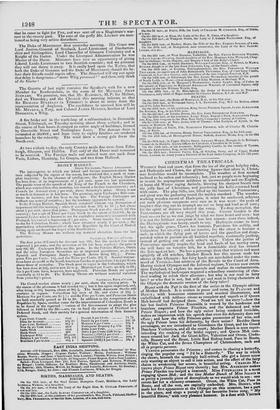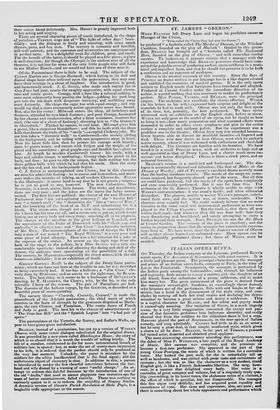CHRISTMAS THEATRICALS.
WITHOUT frost and snow, that form the ice of the great holyday cake, and Harlequin and Clown, the glittering figures that adorn it, Christ- mas festivities would be incomplete. The weather at first seemed inclined to be sullen and refractory; but, just as people were beginning to resent its unpropitious mildness as unseasonable and un-English, in burst old Winter raging furiusly, blowing bis sharpest breath into the jolly face of Christmas, and powdering his holly-crowned head with snow. The play-bills, too, lifted up the banners of Pantomime; and great was the gathering round the motley standard. The wonder- working wooden sword of Harlequin, it must be confessed, achieves not such glorious conquests over care as it was wont : the peals of laughter that ring out its triumph are not so long and loud as of yore; for the spirit of dulness infected the ramp. To drop metaphor, the Pantomimes are all very stupid this year. Covent Garden is the least so—so far as we can judge by what we have heard and seen : but it is not the brilliant exception it was last season: even then, indeed, the Ilarlequinade was heavy, sooth to say. Harlequin seems to have lost his agile grace, Clown his humour, Pantaloon his anility, and Columbine her vivacity ; and no wonder, for the chace is become a mele, in which the flying pair of lovers and the guardian and disap- pointed suitor in pursuit are all huddled together, continually jostling, instead of getting out of each other's way. Unless the genius of Pantomime speedily inspire the head and heels of her motley crew, she will have no votaries left, for a formidable rival has entered the lists against her. No less a personage than that wittiest and most sprightly of old witches, Mother Bunch has this season made her advent at the Olympic: her fairy bands are marshalled under the coin- mand of VESTRIS—late mistress of the Revels to the Court of Jove. Having visited Olympus and the Infernal regions, VESTRIS now enters upon Fairyland, to explore its marvels and realize its enchantments. The mythological burlesques required a schoolboy smattering of clas- sical reading to relish their allusions ; but who is not read in fairy lore? or who that is not, but will go and read in living characters at the Olympic the dramatic version of the fairy tales? Riquet with the Tuft is the first of the series in the Olympic edition of Mother Bunch. It is written in prose and verse, by PLANCHE and DANCE; with humorous comments and musical illustrations, and embellished with tableaux limns as complete and superb as if Queen Mab herself had designed them. Need we tell the story ?—how the fair but foolish Princess Emeralda is wooed by the handsome and brainless exquisite Prince Finnikin, and the deformed and wise Prince Riquet ; and how the ugly suitor being rendered invisible, makes an impression with his speech that even his deformity does not efface ; and how the silly Princess gains possession of her wits, and the ugly Prince loses his deformity, by their union? Besides these personages, we are introduced to Greenhorn the Great, and his Grand blutchess Verdantica, and all the court; Mother Bunch is seen super- intending the cooking of the bridal supper ; and Queen Mah sum- mons around her Jack the Giant.killer, 'Valentine and Orson, Cinde- rella, Beauty and the Beast, Little Red Riding-hood, Puss in Boots, the White Cat, and the Seven Champions of Christendom, each and all in propria persona. VESTA'S personates the Princess ; and comes in chasing a butterfly?, singing the popular song " Pd be a Butterfly." The way in which she shows, beneath the seemingly half-witted, idle girl a latent sense only wanting an object to call it into action, and the effect of the fairy charm in awakening her senses, is beautiful acting. CHARLES MIL.. THEWS plays Prince Riquet very cleverly ; hut Mrs. ANDERSON makes Prince Finniltin too insipid a coxcomb. Miss FITZWALTER is a most engaging Queen Mab ; and the tiny Mother Bunch of Miss Isaacs ut as pretty a juvenile piece of decrepitude as we would wish to see : one covets her for a chimney. ornament. Orson, the White Cat, Puss in Boots, and all the rest, are capitally embodied. Mrs. HONEY, who made her first appearance at the Olympic on this occasion, has a part in the piece, and sings a parody of her favourite Swiss song, " My beautiful Rhine," with very pleasant humour. In a duet with VESTRIS
their voices blend deliciously. Mrs. HONEY ia greatly improved both in her acting and singing. There are several charming pieces of music introduced, in the shape parodiesVESTRIS sings one of " The light of other days " beau- tifully : and the dialogue is lively and amusing, with some smart rhymes, puns, and bon mots. The scenery is romantic and fanciful, and well painted ; and the costumes and accessories are sumptuous and in perfect taste. It is a delightful treat for children, great and small. For the benefit of the latter, it should be played as a first piece—a place it well deserves ; for though the Olympic is the earliest over of all the theatres, it is too late for some of the very little people who will flock .to see Mother Bunch—and we would not base one of them miss it.
Of the Pantomimes there is little to be said. The subject of the Covent Garden one is George Barnwell; which having in its dull and dismal shape been often inflicted upon the apprentices, they may now have their revenge in a shout of laughter. The introduction is good, and humorously acted. J. C. SMITH, who made such capital fun in Guy Faux last year, enacts the naughty apprentice, with equal clever- ness and comic gusto. Georgy, with a face like a colossal codling, is seen most vehemently busy posting the ledger—jobbing his yard-long pen into the ink-horn with desperate intensity, and scribbling away most furiously. He chops the sugar too with equal energy ; and one would say that a more strenuously active apprentice never was bound. But, alas for his virtue ! Milvvood enters the Shop, all furbelows and -flounces, attended by two black footmen ; and poor Georgy, fascinated by her charms and condescension, after a faint resistance, receives her card, (the size of a sheet of foolscap) directing him to "the Gunner's in Shoreditch." Thither he repairs, in evil hour. Milwood gives him a pistol, like a corpulent blunderbuss : and this he loads with the three balls that denote the trade of his "uncle "—a capital Cockney joke. We see him take a " dioramic walk" to Camberwell—the scenery gliding in the background, and he toiling with non-progressive steps in front. Now his heart fails him, then he primes his courage with brandy ; anon he grows weary, and sweats with fatigue and the weight of his pistol and his conscience : great goggle-eyes and fiendish faces glare on him. At length he reaches Camberwell Grove : his uncle, with a large and solemn visage, is meditating; Georgy claps his pistol to his back, and fires : he goes to rifle the corpse, but finds nothing but the three golden balls with which he had shot his uncle. Here the story and the fun end, and the harlequinade begins.
C. J. SMITH is metamorphosed into Clown ; but in this character we miss his admirable fooling : he is coarse and humourless, and more- over makes the mistake of talking, as all modern Clowns do. ELLAR is the Harlequin : it seems hard to say that lie is not grown younger— he is yet as good as any, however. The new Columbine, Miss SCHMIDT, is a neat, active, little dancer. The tricks and transforma- tions are very poor ; and the jokes are the worse for being uncon- nected. The best hits are political: the change of the new Houses of Parliament into " the yarn-spinning company ;" the " Sunday Bill " into " a Scotch mull ;" the " distinctive die" into a " mess of Rice ;" and the knocking off the head of an M. P. and substituting for it a block. The steam-arm, though not a new idea, is amusingly done: the Clown has his arm cut off, and a steam-arm is put on, which keeps bitting out at every body and every thing, smashing all in its progress. The change of the omnibus to the great balloon at Vauxhall, and the appearance of the Duke of Brunswick with his " cloak, cap, arid umbrella," is effective too : and " Jim Crow" is a tolerable imitation of Mr. RICE. The metamorphosis of the statue of George the Third into a man of war named " The Royal William," is a very poor and stale piece of loyal allegory. Here was a fair occasion for a joke at the expense of the statue. An ascent on the tight rope from the back of the stage to the gallery, by a Miss IRVINE, was a very un- comfortable spectacle: instead of admiring the daring and skill of the dancer, the audience were speculating on the possibility of a fall. The scenery. by MaasitALL—especially the street scenes, with the old houses—is admirable : it is an exhibition of itself.
Gammer Gurton's Needle is the subject of the Drury Lane panto- mime ; which we have not been at the trouble to see, for it is described as being excessively bad. It too has a balloon ; a "Jim Crow," cle- verly done by BEDFORD; and an ascent on the tight-rope, by BLACK- MORE. The best thing in it seems to be a burlesque of DUVERNAY'S dancing, by T. MATHEWS, the Clown ; who, by the by, is the only tolerable Clown of the season. The pair of Pantaloons are bad. The diorama of the balloon voyage, by the GRIEVES, is described as a beautiful piece of scene-painting.
The nursery rhyme " Cowardy, Cowardy, Custard," is made the groundwork of the Adelphi pantomime ; the chief merit of which consists in the feats of strength by the gymnasts disguised as Harle- quin, the two Clowns, and Pantaloon, The comic dance of Punch and Judy is good. The best bit is the change of advertisements of "The Poor-law Bill" and the "Spanish Legion" into "a bad pair of specs."
The pantomimes at the Victoria, the Surrey, and Sadler's Wells, ap- pear to have given great satisfaction.
BRAHAM, instead of a pantomime, has got up a version of WEara's Oberon, with some comic dialogue substituted for the original drama. It was preceded by a new piece called Bletchington House; the story of which is so absurd that it is worth the trouble of telling briefly. The life of a cavalier, condemned to die for some unintentional breach of military law, is spared : but, to make the act of mercy more impressive to his wife, it is ordered that the pardon should only be produced at the very last moment. Unluckily, the paper is mistaken by the soldiers for the white handkerchief that is the fatal signal ; and the unfortunate object of clemency is shot. In addition to this, a parson is introduced to render the few cheerful interviews between the hus- band and wife dismal by a warning of some "awful change." An at. tempt to enliven this doleful business by the introduction of one of the old "drolls," that used to amuse playgoers two centuries ago for want of better entertainment, failed entirely. There was nothing so curiously quaint in it as to redeem the stupidity of Singing Simkin. A dramatic version of HOOD'S Parish Revolution at Stoke Pogis, is a laughable trifle appropriate to the season.























 Previous page
Previous page